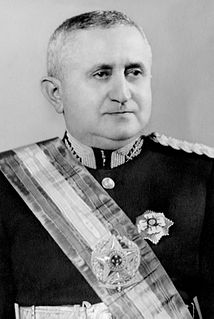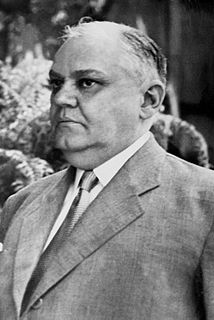 |
|---|
| This article is part of a series on the politics and government of Brazil |
| Foreign relations |
General elections were held in Brazil on 2 December 1945, [1] the first since the establishment of Getúlio Vargas' Estado Novo. The presidential elections were won by Eurico Gaspar Dutra of the Social Democratic Party (PSD), whilst the PSD also won a majority of seats in both the Chamber of Deputies and the Senate. Voter turnout was 83.1% in the presidential election, 83.5% in the Chamber elections and 76.7% in the Senate elections. [2]

Brazil, officially the Federative Republic of Brazil, is the largest country in both South America and Latin America. At 8.5 million square kilometers and with over 208 million people, Brazil is the world's fifth-largest country by area and the fifth most populous. Its capital is Brasília, and its most populated city is São Paulo. The federation is composed of the union of the 26 states, the Federal District, and the 5,570 municipalities. It is the largest country to have Portuguese as an official language and the only one in the Americas; it is also one of the most multicultural and ethnically diverse nations, due to over a century of mass immigration from around the world.

Getúlio Dornelles Vargas was a Brazilian lawyer and politician, who served as President during two periods: the first was from 1930–1945, when he served as interim president from 1930–1934, constitutional president from 1934–1937, and dictator from 1937–1945. After being overthrown in a 1945 coup, Vargas returned to power as the democratically elected president in 1951, serving until his suicide in 1954. Vargas led Brazil for 18 years, the longest of any President, and second in Brazilian history only to Emperor Pedro II among heads of state. He favored nationalism, industrialization, centralization, social welfare and populism – for the latter, Vargas won the nickname "The Father of the Poor". Vargas is one of a number of populists who arose during the 1930s in Latin America, including Lazaro Cardenas and Juan Perón, who promoted nationalism and pursued social reform. He was a proponent of workers' rights as well as a staunch anti-communist.

Eurico Gaspar Dutra was a Brazilian military leader and politician who served as 16th President of Brazil from 1946 to 1951. He was the first President of the Second Brazilian Republic which immediately followed the Vargas Regime.
















